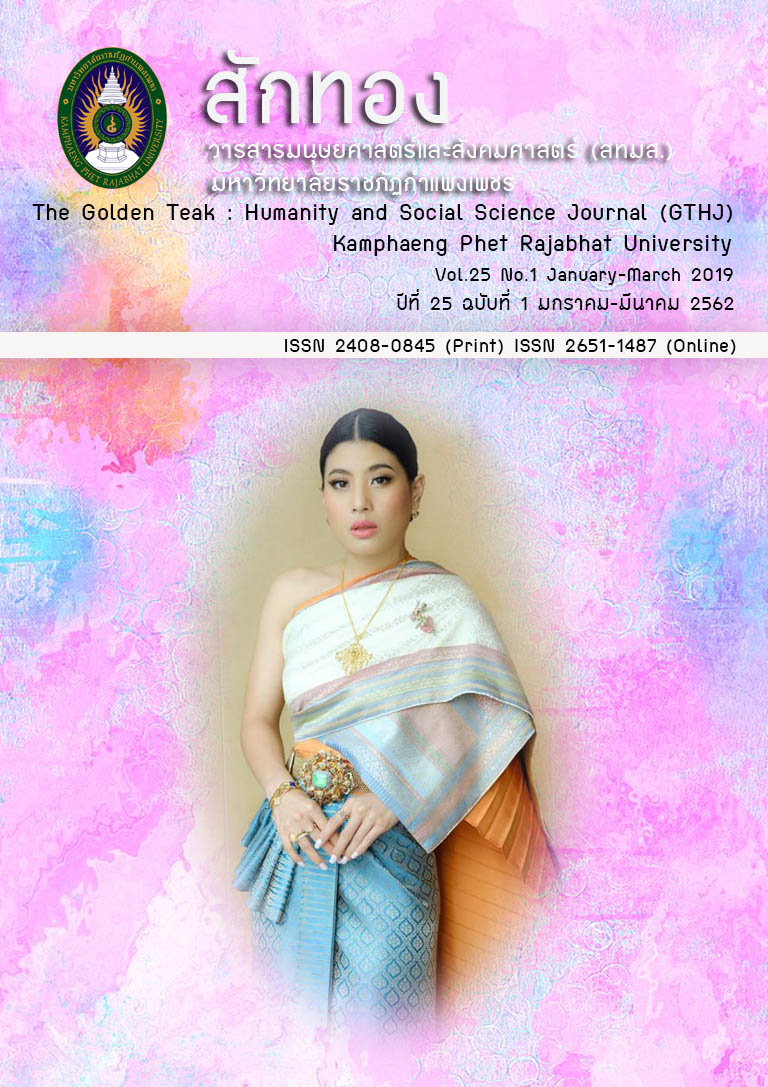Environmental and Social Return on Investment of Community Biomass Briquettes System
Main Article Content
Abstract
Investment of community biomass briquettes production system of Baan Phaisriaroon Farmer Group, Tha Luang Subdistrict, Muang District, Phichit Province, is not only to maximize profits, but also to take into account the "benefits" and "costs" of environmental and social impacts from system investment. This paper presents the environmental and social outcomes, or the triple benefits, of investment in system by using SROI as a strategic planning and project improvement tool as well as discussing the results with those who are interested in investing. In the assessment, there is an analysis of revenues and expenses relative to stakeholder groups and a participatory outcome chain. The input of the system is the biomass technology and the output is the annual fuel produced. The fuel has a heating value between 5,813.74 to 6,521.36 kcal/kg. The community development association is responsible for operating and maintaining the activity. The outcome concerning the increased revenue of community members from the sale of fuel rods and improving community quality of life as well as reducing waste pollution over a period of one year. The environmental and social assessment of the community biomass briquettes production system investment showed a Social Return on Investment (SROI) at 3.71, Return on Investment (ROI) at 3.70, Net Present Value (NPV) at 1,471,353.39 Baht with Payback Period of 3.24 months.
Article Details
บทความที่ได้รับการตีพิมพ์เป็นลิขสิทธิ์ของวารสาร สักทอง : วารสารมนุษยศาสตร์และสังคมศาสตร์ สถาบันวิจัยและพัฒนา มหาวิทยาลับราชภัฏกำแพงเพชร
ข้อคิดเห็นใดๆ ที่ปรากฎในวารสารเป็นวรรณกรรมของผู้เขียนโดยเฉพาะ ซึ่งมหาวิทยาลัยราชภัฏกำแพงเพชรและบรรณาธิการไม่จำเป็นต้องเห็นด้วย
References
Cambero, C. & Sowlati, T. (2014). Assessment and optimization of forest biomass supply chains from economic, social and environmental perspectives-a review of literature. Renewable and Sustainable Energy Reviews, 36, 62-73.
Chayakornkongwuth, N., Cooharojananone, N. & Chandrachai, A. (2013, September-December). Innovative Evaluation System to Determine the Feasibility for the Non-Profit Organization. WMS Journal of Management, Walailak University, 2(3), 1-7.
Jianjun Hu., et al. (2014). Economic, environmental and social assessment of briquette fuel from agricultural residues in China-a study on flat die briquetting using corn stalk. Energy, 64, 557-566.
Petsuwan, S., et al. (2014) Impact Assessment on Technology Transfer of Biogas Production.Proceedings of the 8th Thailand Renewable Energy for Community Conference during 12-14 November 2014 at Rajamangala University of Technology Rattanakosin, 721-726.
Pewnim, R. & Pimsakul, S. (2011, March) Feasibility Study of Setting up a Coconut Shell Charcoal Briquette Plant in Prachuapkhirikhan. Ladkrabang Engineering Journal, 28(1), 49-54.
Phattanasarn, A. (2016, September-December). Local Network Organization on Development of Community and Environment in Chaiyaphum Province. The Golden Teak : Humanity and Social Science Journal, 22(Special), 85-93.
Phoochinda, W. (2014) Environmental Impact and Social Return of the Use of Biomass in Community and Household Levels. Bangkok : National Institute of Development Administration.
Suedongloy, U., Chaowakeeratiphong., T. & Polprasert, P. (2017, May-August). Strategy Development for Electrical Power Saving Administration in Vocational institutes under the Institute of Vocational Education Northern Region 4. The Golden Teak : Humanity and Social Science Journal, 23(2), 156-169.
Thailand Environment Institute, Foundation. (2014). Annual Academic Meeting of Thailand Environment Institute Post Rio+20: Thailand Sustainable Development Move. [Online]. Available : www.tei.or.th/postrio20/Room_1/Background%20paper.pdf [2014, August 20].

